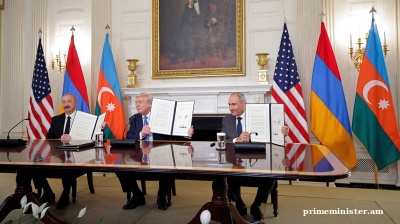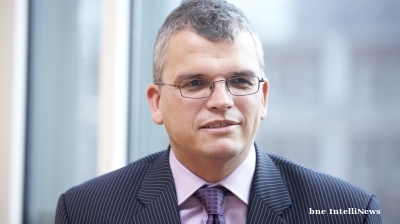Perhaps the most important thing for the Russian leadership in this episode was to prevent the need to actually go to war against Ukraine in the future. Going for overkill in terms of military manoeuvres on the Ukrainian border now may avoid the need to do terrible things at a later point.
The troops are not yet back at their bases, but the war alert along the Russo-Ukrainian border has passed. In fact, a war was never in the cards. Yet the alert, while it lasted, was profoundly disturbing. For the West, it highlighted the dangers of a large-scale direct clash between Russia and Ukraine. For Russia, which hitherto has dismissed the Donbas conflict as a civil war in Ukraine, it opened up the prospect of having to wage a real war against a large neighbouring country. And for Ukraine, such a war might have been existential.
With the threat of war receding, it is important not to waste this dangerous experience, and instead to draw conclusions from it. For that, it’s essential to understand what was driving the behaviour of the parties involved, to explain the moves that they made, and to consider the short and medium-term results of the face-off.
Drivers
Seven years after its Maidan revolution, Ukraine is a country in considerable difficulties. Economically, its GDP is still 20% below its pre-Maidan level; politically, it has not yet established a stable balance among the vested interests; ideologically, and in many ways culturally, it continues to be split. Ukraine has become a ward of the West, but its prospects of being admitted to NATO, not to mention the EU, are very remote: essentially non-existent for the foreseeable future. Since being elected president in 2019, Volodymyr Zelenskiy and his party have lost much of their once astounding popularity. The Servant of the People party has come under heavy pressure from the Russophone opposition based in the east of the country, and the nationalists rooted in Ukraine’s west.
Seven years after the start of its confrontation with the United States, Russia is bracing itself for even more pressure from Washington. For US President Joe Biden, Russia is a lower foreign policy priority than it has been for any US administration since FDR. Biden talks tough, imposes sanctions, and is going after Russian interests such as the Nord Stream II pipeline. Russia’s relations with Europe are worse than they have ever been since the days of Mikhail Gorbachev. The special relationship with Germany is no more. The dialogue with France, always superficial, has definitively stalled. At the same time, co-ordination between US and European policies on Russia has substantially increased under Biden.
The self-proclaimed people’s republics in the Donbas have been in limbo throughout these years. They are increasingly distancing themselves from Ukraine and integrating ever more closely with Russia. The ruble is the currency; Russian is the only official language; and 10% or more of the population of 3.6mn have already acquired Russian citizenship. Yet their future is unclear. Still wedded to the Minsk peace process and unwilling to sever its remaining ties with Europe, Moscow will not formally recognise the republics or allow them to accede to Russia. Frustration is mounting.
Behaviour
It was Zelenskiy who moved first. He dealt a serious blow to the Russophone opposition by closing down its TV stations and charging its leaders with high treason. From a staunchly nationalist position, he advanced into the political territory of former president Petro Poroshenko. He took on the legal system head-on and elevated the National Security and Defense Council to the top position in the Ukrainian government. Most recently, he also demonstrated his willingness to stand up to Russia.
In February, Zelenskiy ordered troops (as part of the rotation process) and heavy weapons (as a show of force) to go near to the conflict zone in Donbas. He did not venture out as far as Poroshenko, who dispatched small Ukrainian naval vessels through the Russian-controlled waters near the Kerch Strait in late 2018, but it was enough to get him noticed in Moscow. The fact of the matter is that even if Ukraine cannot seriously hope to win the war in Donbas, it can successfully provoke Russia into action. This, in turn, would produce a knee-jerk reaction from Ukraine’s Western supporters and further aggravate Moscow’s relations, particularly with Europe. One way or another, the fate of Nord Stream II will directly affect Ukraine’s interests. Being seen as a victim of Russian aggression and presenting itself as a frontline state checking Russia’s further advance toward Europe is a major asset of Kyiv’s foreign policy.
Even though Kyiv’s moves at that time were not preparations for a military offensive (Dmitry Kozak, Russia’s senior official responsible for dealing with Ukraine, said he saw them as a PR stunt), the Kremlin decided to seize upon them to raise the stakes. Given the current state of Russian-US relations, Moscow felt it had nothing to lose and something to gain by acting boldly and on a larger scale. Russia decided not so much to test the new US president as to warn him early on of the dangers involved regarding Ukraine.
The Russian military massed troops along the entire Russo-Ukrainian border, from the north to the east to the south. It did so visibly and made sure that Western observers could analyse the manoeuvres and conclude that they might not necessarily be a drill. Some reports, for example, spoke of field hospitals being brought to the border. In making its move, Moscow was pursuing several objectives:
To intimidate and deter Ukraine’s leaders, whom the Kremlin regards as inexperienced and irresponsible (in Kozak’s disparaging words, “children with matches”);
To send a message to the United States urging Washington to take better care of its wards, lest they get America itself into trouble (there were repeated references to the Mikheil Saakashvili syndrome, referring to the then Georgian leader launching an attack in 2008 against the Russian-protected breakaway region of South Ossetia in the belief that he would be supported by a US military intervention, which never came);
To convince the Germans and the French that supporting everything that Ukraine says or does carries a cost for Europe;
To reassure the people of Donbas that Russia will not abandon them to the Ukrainian army should it attack the two enclaves.
During the crisis, Kozak, who is also the Kremlin’s deputy chief of staff, essentially repeated President Vladimir Putin’s earlier stern warning that a Ukrainian offensive in Donbas would spell the end of Ukrainian statehood.
Having made their points by means of actions on the ground, the Russians were then available to discuss the situation, both with German and French political leaders and the top US military commander. In those conversations, they dismissed out of hand all European criticisms about the troop movements on their own territory and only engaged in a detailed professional discussion with the US chairman of the Joint Chiefs of Staff, simply to help him avoid a dangerous miscalculation.
Results
It appears that in the short term, President Zelenskiy got what he was aiming for. Having burnished his patriotic credentials, Zelenskiy strengthened his position. In foreign policy terms, it was amid the crisis along the border that President Biden called Zelenskiy for the first time, ending an awkward pause. Both NATO as an institution and individual US allies voiced their support for Ukraine. The UK, in its new role as a power separate from the EU, convened a meeting of Ukraine’s closest friends: the United States, Canada, Poland and Lithuania. Against that background, Zelenskiy repeated Kyiv’s earlier request to be admitted to NATO.
It is hard to say whether Russia has “won” anything. Moscow certainly backed up its earlier verbal warning with a credible demonstration of force. However, it is less clear whether Russia’s demonstration will lead to the United States monitoring its Ukrainian clients more closely and avoiding making misleading statements of the kind that landed Saakashvili in trouble in 2008. As for the Germans and the French, who of course are much more worried about a war in their own neighbourhood, they have little influence in Kyiv. Russian pleas for the Europeans to take a less uncritical attitude toward Ukrainian policies and actions are unlikely to be heeded.
Perhaps the most important thing for the Russian leadership in this episode was to prevent the need to actually go to war against Ukraine in the future. It’s unlikely that Putin was bluffing when he said that a major attack against Donetsk and Luhansk would provoke a massive Russian response with catastrophic consequences for Ukraine. Unlike the 2008 war with Georgia, in which Russian objectives were limited to restoring the territory of the South Ossetian enclave and temporarily holding some areas in Georgia proper, it appears a war against Ukraine would be bigger by several orders of magnitude. Such a war would also deeply affect Russia itself and its international position. Going for overkill in terms of military manoeuvres on the Ukrainian border now may avoid the need to do terrible things at a later point. Under that same logic, doing nothing now would sow uncertainty and invite trouble, while doing nothing when trouble arrives would be suicidal for the Kremlin leadership. While Russia is not looking for more US sanctions, it is ready to take them as a price for its muscle-flexing.
Prospects
The passing of the war scare is not the same thing as de-escalation. The high level of tension in the region is now the new normal. Unfortunately, there is no political solution in sight. The 2015 Minsk II agreement, the basis of the diplomatic process for ending the Donbas conflict, was stillborn. To the keepers of the national flame in Kyiv, implementing that agreement would always have been a case of high treason. Poroshenko only signed it because the Ukrainian military was decimated in Donbas, and it was the only way to stop the disaster. Putting the agreement into practice, however, threatened to undermine the work of the Maidan revolution by giving Russia a foothold, and thus was deemed completely unacceptable. Withdrawing from the Minsk agreement is not an option for Kyiv either, however, because the agreement was brokered by Berlin and Paris. Zelenskiy’s mission to get Russia to agree to a major revision of the Minsk terms in Ukraine’s favour has turned out to be impossible.
Expanding the format of the Normandy talks (currently held among France, Germany, Russia and Ukraine) to get the dialogue to result in an agreement is both impossible – Russia is unlikely to agree to US participation – and impractical: even if the United States, which is not particularly willing, were to join, it would not lead to Russia yielding under US pressure.
Absent progress on the Minsk agreement and Normandy talks, however, diplomacy will be increasingly practised not in the usual way of harrowing but confidential negotiations (tellingly, Russia’s Kozak, frustrated with his counterparts, proposed making to the talks public: a non-starter, of course), but by means of sending messages through specific actions, like Russia’s current exploits on the Ukraine border. The only lifeline to peace left then will be direct contact between the Russian and US military chiefs.
This article was published as part of the “Relaunching US-Russia Dialogue on Global Challenges: The Role of the Next Generation” project, implemented in co-operation with the US Embassy to Russia. The opinions, findings and conclusions stated herein are those of the author and do not necessarily reflect those of the US Embassy to Russia. It first appeared on the Carnegie Moscow Center website here.
Dmitri Trenin, director of the Carnegie Moscow Centre, has been with the centre since its inception. He also chairs the research council and the Foreign and Security Policy Programme.
He retired from the Russian Army in 1993. From 1993-1997, Trenin held a post as a senior research fellow at the Institute of Europe in Moscow. In 1993, he was a senior research fellow at the NATO Defense College in Rome.
Opinion

COMMENT: US-brokered Armenia-Azerbaijan peace deal exposes Russia’s strategic failures
The recent peace breakthrough between Armenia and Azerbaijan is a major diplomatic win for the United States and a setback for Russia, according to a new report published by the Atlantic Council.

COMMENT: Why Beijing will never take Taiwan
Xi Jinping needs to think again before he sends so many young Chinese men and women to their deaths on Taiwan, for if the PLA does one day dare to land, they will be buried here.

COMMENT: Ukraine’s coming financial storm
“A crisis is drawing ever closer. It will break in Ukraine, but it won’t begin on the frontlines, where the country’s battle-weary brigades continue to impose a brutal cost on the Russian invader," writes Timothy Ash of BlueBay Asset Management.

BEYOND THE BOSPORUS: Performance postponed. Hotly anticipated “CHP” trial pushed into October
Every Turk up and down the country has an opinion on what Erdogan is up to.



